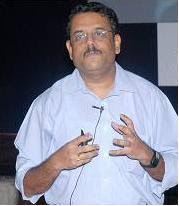If we train & educate our service professionals
to work on a plane, hard ground of assembly lines and equip them to follow
instructions & processes and then reward/penalize them based on the target
numbers, how do we expect them to work in swampy, lowland? The reality is swampy, lowland where things don’t
always work as written in theory books or process manuals. Like the vegetable
vendor, one needs to jump out, not necessarily to the next shop but at least to
understand what customers want. In the case of platinum customer, we saw that
the customer found his own solution to solve the billing problem.
The model of Technical Rationality –the view of the
professional knowledge has most powerfully shaped our thinking about
professions and to work with rigor in a plane, hard ground. From the perspective of Technical Rationality, professional practice
is a process of problem solving and the professionals are trained to solve
problems of choice or decision through the selection, from available means, of
the one best suited to established ends. Technical
rationality depends on the agreement about the ends. When ends are fixed
and clear, then the decision to act can present itself as the instrumental
problem. But when ends are confused and
conflicting, there is yet no problem to solve. This is the dilemma in our rigor
of processes & metrics versus the relevance of unique customer situations.
Our training and education system ignore the key aspect of service management,
value creation and innovation. We are equipped to work only in high, hard land,
on assembly lines where both means and ends are defined; we are programmed to
just follow the instructions to work in the mode of input-defined
process-output. Every organization needs standardization at some point and the quality systems, policies and procedures become part of the system. The key for success here is, how do we still keep alive the passion and commitment of the vegetable vendor and how we keep the capabilities connected with reality. If the customer executives are trained to follow the process, use only the scripts, and if the Manager’s performance is assessed only based on the numbers like growth, volume, speed, efficiency etc, it’s a tough call to focus equally on value creation & customer satisfaction.
The objective of building capabilities, acquiring deep knowledge & specialization is to solve customer problems or design solutions to meet their needs. But if specialization builds silos that are operating only in their domain with no regard for customer needs, it defeats the business purpose. When the process capabilities fail to connect with real operations issues like escalations, project transitions etc it becomes a constraint to service delivery. People & Process capabilities need to have adaptable capacity to work on swampy, low ground; specialization & standardization designed for plane, hard ground are deterrents for service excellence and business growth. If concepts refer to facts, then knowledge has a base in reality but if concepts are cut off from reality, then so is all human knowledge and our actions are going to be helplessly blind.
Theory & concepts are not made only for ideal conditions. The Service Leader should look at every problem situation or opportunity as unique and use the concepts only to educate the mind, to see deeply, and not force fit the theory. He/She should train & prepare the Manager’s and their team to focus both on process & value creation. Theory and Practice both are important and any extreme position will yield bad results, reflecting on theory and experience is the key for transformation. The Reflective Practitioner doesn’t see the deductive thinking process as the end in itself, rather they bring life to it by integrating the inductive process to evaluate the situations and recognize the gaps between vision & reality, theory & practice. The Service Leader as a Reflective Practitioner loops back the edges of contradictions, conflicts, complexities & uncertainties and moves from specific application to general concepts through the inductive process to bridge the gaps.
Copyright Sunil P Rangreji


No comments:
Post a Comment